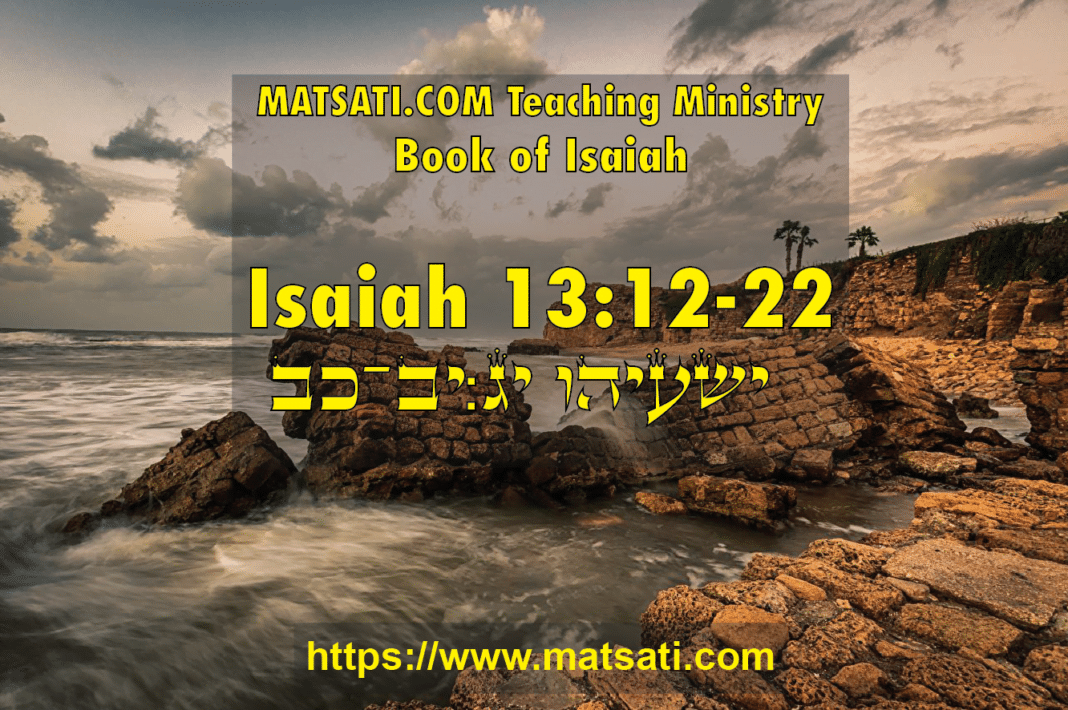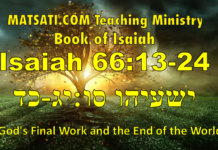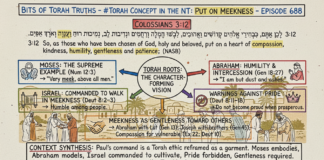Table of Contents
Introduction to Isaiah 13:12-22
In the next set of verses, Isaiah provides a description of the savagery of war, how Judah and Jerusalem will be destroyed. We should be aware what it was like back in those days, and even today in some regions around the world with certain armies these things continue to take place today, such as the rape of women, the killing of children, etc. This isn’t to say that this does not happen in some armies as I am sure all armies around the world did these things at one point or another in history, likely on an individual basis or a group of men within the military, etc. It is interesting however how the army of Israel did not function in this way during the time of David. The men of Israel, their faith had a significant influence upon their lives, especially in times of war. We read according to the Scriptures 1 Samuel 21:5-7 (21:4-6 English) that David and his men sanctified themselves prior to and during their missions in a manner of holiness according to the Torah.
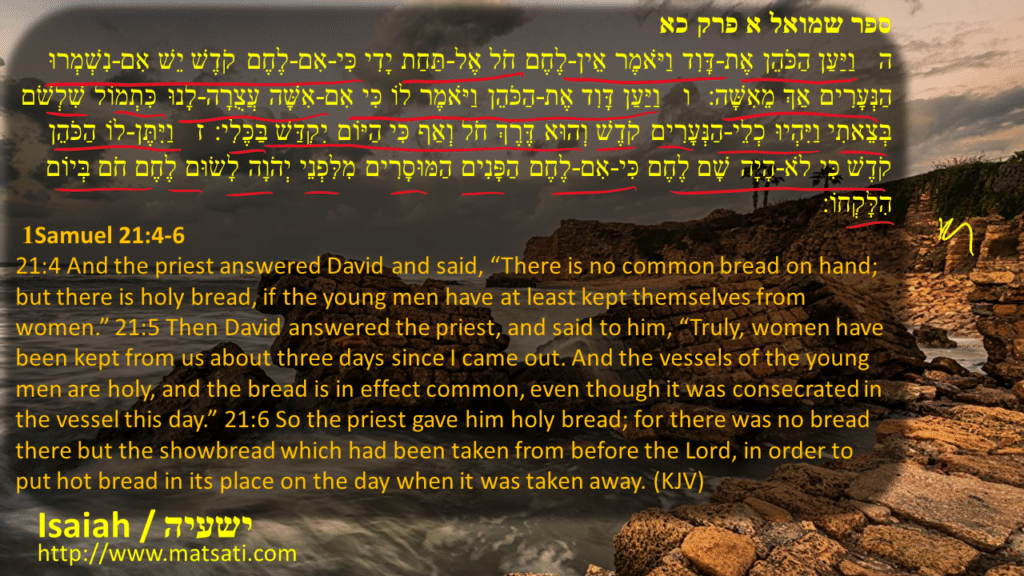
ספר שמואל א פרק כא
ה וַיַּעַן הַכֹּהֵן אֶת-דָּוִד וַיֹּאמֶר אֵין-לֶחֶם חֹל אֶל-תַּחַת יָדִי כִּי-אִם-לֶחֶם קֹדֶשׁ יֵשׁ אִם-נִשְׁמְרוּ הַנְּעָרִים אַךְ מֵאִשָּׁה: ו וַיַּעַן דָּוִד אֶת-הַכֹּהֵן וַיֹּאמֶר לוֹ כִּי אִם-אִשָּׁה עֲצֻרָה-לָנוּ כִּתְמוֹל שִׁלְשֹׁם בְּצֵאתִי וַיִּהְיוּ כְלֵי-הַנְּעָרִים קֹדֶשׁ וְהוּא דֶּרֶךְ חֹל וְאַף כִּי הַיּוֹם יִקְדַּשׁ בַּכֶּלִי: ז וַיִּתֶּן-לוֹ הַכֹּהֵן קֹדֶשׁ כִּי לֹא-הָיָה שָׁם לֶחֶם כִּי-אִם-לֶחֶם הַפָּנִים הַמּוּסָרִים מִלִּפְנֵי יְהֹוָה לָשֹוּם לֶחֶם חֹם בְּיוֹם הִלָּקְחוֹ:
1 Samuel 21:4-6
21:4 And the priest answered David and said, “There is no common bread on hand; but there is holy bread, if the young men have at least kept themselves from women.” 21:5 Then David answered the priest, and said to him, “Truly, women have been kept from us about three days since I came out. And the vessels of the young men are holy, and the bread is in effect common, even though it was consecrated in the vessel this day.” 21:6 So the priest gave him holy bread; for there was no bread there but the showbread which had been taken from before the Lord, in order to put hot bread in its place on the day when it was taken away. (KJV)
The purpose of sanctifying oneself before war was so one could ask the help of a holy and righteous God to protect one’s life and empower him in battle. This is likely the motivation of David and his men. David tells Ahimelech the priest that they have kept themselves holy and pure. This imagery is counter to our modern times who consider purity and holiness undesirable. Isaiah is telling us according to chapter 13 the kind of army that God is bringing upon the people due to her unrepentant sins. Pride will lead to each man turning against his brother as well, and turn nation against nation in the most terrible savagery. The Lord God caused this to come to pass as pride and sin are ultimately to be wiped out in one way or another! The point is that when a nation, or even an individual refuses to listen to the voice of God, this will lead to destruction, and even to willfully making choices that will lead to even destroying ourselves by our own hands. The pain and the horror of war could be avoided, if all peoples would listen to the voice of God, seek our Father God in heaven, and believe in His Son Yeshua the Messiah there would be peace!
Isaiah goes on saying the following according to Isaiah 13:12-13.
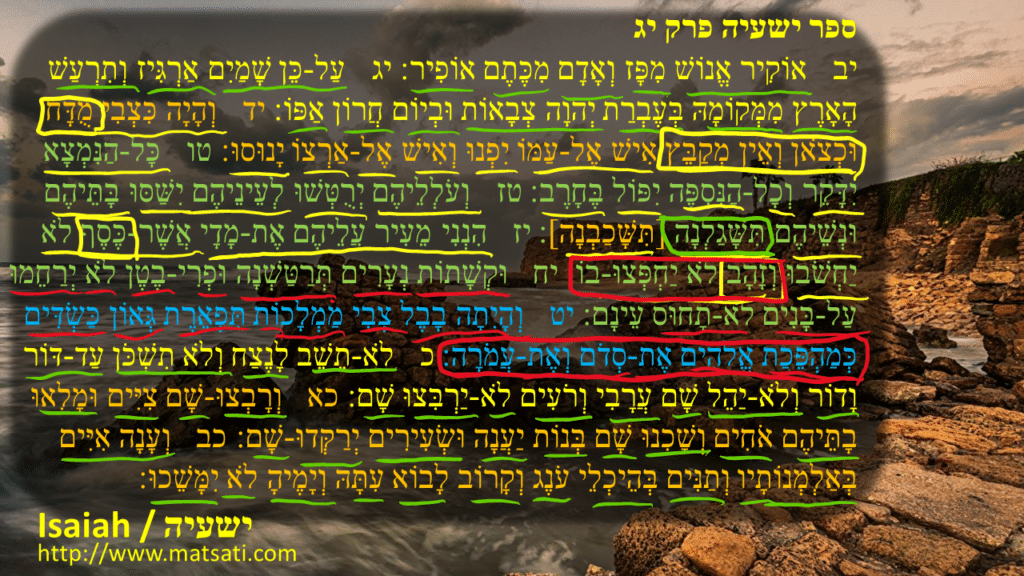
ספר ישעיה פרק יג
יב אוֹקִיר אֱנוֹשׁ מִפָּז וְאָדָם מִכֶּתֶם אוֹפִיר: יג עַל-כֵּן שָׁמַיִם אַרְגִּיז וְתִרְעַשׁ הָאָרֶץ מִמְּקוֹמָהּ בְּעֶבְרַת יְהֹוָה צְבָאוֹת וּבְיוֹם חֲרוֹן אַפּוֹ:
Isaiah 13:12 states, “I will make a man more precious than fine gold; (אוֹקִיר אֱנוֹשׁ מִפָּז) even a man than the golden wedge of Ophir. (וְאָדָם מִכֶּתֶם אוֹפִיר)” Isaiah 13:13 “Therefore I will shake the heavens, and the earth shall remove out of her place, (עַל-כֵּן שָׁמַיִם אַרְגִּיז וְתִרְעַשׁ הָאָרֶץ מִמְּקוֹמָהּ) in the wrath of the LORD of hosts, and in the day of his fierce anger. (בְּעֶבְרַת יְהֹוָה צְבָאוֹת וּבְיוֹם חֲרוֹן אַפּוֹ)” Looking at 13:12 very closely we note the following:
אוֹקִ֥יר אֱנ֖וֹשׁ מִפָּ֑ז וְאָדָ֖ם מִכֶּ֥תֶם אוֹפִֽיר
In Isaiah 13:12 the atnakh is on the word מִפָּ֑ז which divids the verse into two parts. The first half of the verse does not say explicitly “I will make a man more precious than fine gold.” The word אוֹקִיר is written in the hif’il first person singular verb form, meaning “be difficult to carry weight,” אֱנוֹשׁ “man,” מִפָּז “pure gold” so the more accurate rendering is “a man will be more weighty than pure gold.” The second half writes, וְאָדָם מִכֶּתֶם אוֹפִיר “even a man gold of Ophir.” This verse speaks to the value that the Lord God places upon our lives. This also reminds us of the days of Solomon and the amount of gold that came from Ophir each year. The idea here is related to the preciousness of man, especially in his creation! The Torah states that the Lord made man in His image or likeness (Bereshit / Genesis 1:28). This means that each person is unique and worthy of respect, compassion, and understanding. Rashi writes that being created in God’s image meant that we possess qualities of understanding and discernment. Nachmanides writes that God is immortal, and so is the human soul. The way each Jewish commentator writes concerning these things, they write in such a way so as to help us to realize how unique God is in all the world. By recognizing this we realize that we are not to make God in our own image (i.e. anthropomorphisms) in our minds. We should keep a Torah centric approach to our understanding of Who God is! This idea of being created in the image of God (b’tzelem elohim, בְּצֶלֶם אֱלֹהִים) is also related to how we see ourselves and how we respond to others. Note that pride leads to fighting and quarreling with others. When we have the correct perspective coupled with faith in the Lord God Almighty, His presence dwells in our lives, and we do not do these things! If we do not have the Lord God and His Messiah in our lives, we are fully capable of deceiving ourselves into thinking that we are being godly people when we are not! We must recognize that we need the Lord in order to successfully live our lives for Him. When we consider that we are made after the image of God, we need to consider how we treat others in this world, regardless of race, gender, social standing, and even regardless of one’s political outlook. We are all made after the image of God, and the Scriptures say that He is no respecter of persons. (Romans 2:11) We were created with the ability to have an identity and relationship with God as His children. This speaks to relationships, and the way that we live our lives for the Lord will determine whether we truly love the Lord or not!
Isaiah 13:13 states that the Lord God will shake heaven and earth (שָׁמַיִם אַרְגִּיז וְתִרְעַשׁ הָאָרֶץ מִמְּקוֹמָהּ). These words remind us ultimately it is the Lord who is in control over all of His creation. This idea of pride and men taking advantage over one another, the oppression of others, this sin is so great, the Lord brings a great destruction to those who do these things! We also note the significance of this statement, that man’s sin has cosmic consequences (ie shaking heaven and earth)! This describes how our individual sins have far reaching consequences, influencing and affecting others in a way that is opposite of what God had intended. The original intent is by what we see according to the Torah, to Love God and to Love one another, in these two commands all of the commands are summarized. If the people of Israel were able to do these two things, they would not have to experience what is happening to them at this time. These things function as an example to us as well. Note what all is encompassed in the act of loving God, one will obey God’s commands (מִצְווֹת), His Mishpatim (מִּשְׁפָּטִים), and His Khukim (חֻקִּים), and loving one another, one would not commit adultery, coventeousness, murder, stealing, lying, etc. Pride on the other hand leads to the violation of these things, and when left alone for a sufficient amount of time, the reward is the wrath of the Almighty God!
ספר ישעיה פרק יג
יד וְהָיָה כִּצְבִי מֻדָּח וּכְצֹאן וְאֵין מְקַבֵּץ אִישׁ אֶל-עַמּוֹ יִפְנוּ וְאִישׁ אֶל-אַרְצוֹ יָנוּסוּ:
Isaiah 13:14 states, “And it shall be as the chased roe, (וְהָיָה כִּצְבִי מֻדָּח) and as a sheep that no man taketh up: (וּכְצֹאן וְאֵין מְקַבֵּץ) they shall every man turn to his own people, and flee every one into his own land. (אִישׁ אֶל-עַמּוֹ יִפְנוּ וְאִישׁ אֶל-אַרְצוֹ יָנוּסוּ)” The idea of the roe being driven away (מֻדָּח) the imagery is deer flee even at the slightest circumstance. The sheep that isn’t gathered or assembled (וְאֵין מְקַבֵּץ) wanders around and becomes totally lost. These are the behaviors of the people when the military moves against Judah and Jerusalem. Isaiah says each man flees to his own land. It may be that they return to their ancestral land to take refuge from their enemies. The people flee because the invading army and what they will do, loot, destroy, rape, kill, etc.
ספר ישעיה פרק יג
טו כָּל-הַנִּמְצָא יִדָּקֵר וְכָל-הַנִּסְפֶּה יִפּוֹל בֶּחָרֶב: טז וְעֹלְלֵיהֶם יְרֻטְּשׁוּ לְעֵינֵיהֶם יִשַּׁסּוּ בָּתֵּיהֶם וּנְשֵׁיהֶם תִּשָּׁגַלְנָה [תִּשָּׁכַבְנָה]: יז הִנְנִי מֵעִיר עֲלֵיהֶם אֶת-מָדָי אֲשֶׁר-כֶּסֶף לֹא יַחְשֹׁבוּ וְזָהָב לֹא יַחְפְּצוּ-בוֹ: יח וּקְשָׁתוֹת נְעָרִים תְּרַטַּשְׁנָה וּפְרִי-בֶטֶן לֹא יְרַחֵמוּ עַל-בָּנִים לֹא-תָחוּס עֵינָם:
Isaiah 13:15 states, “Every one that is found shall be thrust through; (כָּל-הַנִּמְצָא יִדָּקֵר) and every one that is joined unto them shall fall by the sword. (וְכָל-הַנִּסְפֶּה יִפּוֹל בֶּחָרֶב)” Isaiah 13:16 “Their children also shall be dashed to pieces before their eyes; (וְעֹלְלֵיהֶם יְרֻטְּשׁוּ לְעֵינֵיהֶם) their houses shall be spoiled, and their wives ravished. (יִשַּׁסּוּ בָּתֵּיהֶם וּנְשֵׁיהֶם תִּשָּׁגַלְנָה [תִּשָּׁכַבְנָה])” Isaiah 13:17 “Behold, I will stir up the Medes against them, (הִנְנִי מֵעִיר עֲלֵיהֶם אֶת-מָדָי) which shall not regard silver; and as for gold, they shall not delight in it. (אֲשֶׁר-כֶּסֶף לֹא יַחְשֹׁבוּ וְזָהָב לֹא יַחְפְּצוּ-בוֹ)” Isaiah 13:18 “Their bows also shall dash the young men to pieces; (וּקְשָׁתוֹת נְעָרִים תְּרַטַּשְׁנָה) and they shall have no pity on the fruit of the womb; their eyes shall not spare children. (וּפְרִי-בֶטֶן לֹא יְרַחֵמוּ עַל-בָּנִים לֹא-תָחוּס עֵינָם)” This is why the people flee, כָּל-הַנִּמְצָא יִדָּקֵר “every one that is found will be thrust through” meaning they will be killed with the sword. This is the evils of war, וְעֹלְלֵיהֶם יְרֻטְּשׁוּ לְעֵינֵיהֶם יִשַּׁסּוּ בָּתֵּיהֶם וּנְשֵׁיהֶם תִּשָּׁגַלְנָה [תִּשָּׁכַבְנָה] “Their children also shall be dashed to pieces before their eyes; their houses shall be spoiled, and their wives ravished.” Note the word תִּשָּׁגַלְנָה means “to be raped.” Isaiah goes on to say that the Lord will stir up the Medes and the Medes will not be interested in gold or silver. The Torah indicates that gold and silver were the first and oldest form of money. The first mention of gold in the Torah is in Bereshit / Genesis 2:12 “And the gold of that land is good; bdellium and onyx stone are there.” (KJV) Gold’s rarity, gives it a monetary value which has made it useful in commercial transactions, as well as being a measure of wealth and prominence. The color and luster of gold and its resistance to oxidation, makes it valuable for use in jewelry. The scriptures often mention kings and queens paying in gold and silver. We note in the NT times, it was the wealthy who studied Torah since they did not have to work. In the Tanakh and the NT, gold is compared to acquiring knowledge, wisdom and faith, which is far more valuable. What these things reveal to us based on what Isaiah is saying is that Medea would not be coming for the purpose of acquiring wealth. They are being specifically called by God to do His bidding to punish those who have rebelled against His holy Word. Since it was the Medes and the Babylonians who destroyed Assyria in 609 BCE, and then the Medes who conquered Babylon in 539 BCE, many scholars and commentaries write that this event and this writing in Isaiah were written around that time. Again, this demonstrates a lack of faith in the power of God to reveal future events. John Oswalt mentions that Isaiah failed to write about the Persians who were the main factor in the defeat of Babylon in 539 BCE. If one was writing about these events when they happened, one would not have left out this important people group as they were a major factor in the fall of Babylon. This provides evidence in itself that these events were given to Isaiah prophetically, and that the Isaiah text was not redacted at a later time. John Oswalt goes on to say “On the other hand, it is quite possible that Isaiah of Jerusalem, writing in the late 700s, knew something of the Medes’ fearsome reputation and used them as a figure of the pitiless destruction characterizing the Day of the Lord, without intending any specific prediction.” Does this conclusion demonstrate a lack of faith in the power of God? Was Isaiah simply making up what he thought would happen in the future? These postulations of the how, the why, and the what tend to lead one down the path of doubt. One thing we can be certain of is that we can trust the written Word of God that we have received and was preserved for us all of these years. In historical documents, especially in the case of the Bible, there are a lot of unknowns and variables that we may not understand very well. The point is that regardless of what men may postulate in regards to the inspiration of God’s word, we are called to continue to trust in the Lord God in heaven and believe in His holy Word, including the words of the prophet Isaiah, as the Lord is speaking not just to the hearts of the people in Isaiah’s time, but also to us, calling us to repentance and to walk in His ways of truth, righteousness, and holiness according to His word!
ספר ישעיה פרק יג
יט וְהָיְתָה בָבֶל צְבִי מַמְלָכוֹת תִּפְאֶרֶת גְּאוֹן כַּשְֹדִּים כְּמַהְפֵּכַת אֱלֹהִים אֶת-סְדֹם וְאֶת-עֲמֹרָה:
Isaiah 13:19 states, “And Babylon, the glory of kingdoms, the beauty of the Chaldees’ excellency, (וְהָיְתָה בָבֶל צְבִי מַמְלָכוֹת תִּפְאֶרֶת גְּאוֹן כַּשְֹדִּים) shall be as when God overthrew Sodom and Gomorrah. (כְּמַהְפֵּכַת אֱלֹהִים אֶת-סְדֹם וְאֶת-עֲמֹרָה)” It is interesting how Isaiah contrasts the glory of Babylon with the glory of how God overthrew Sodom and Gomorrah. The glory of Babylon was found in the greatness of her economic power as compared to the other countries. Isaiah contrasts God’s destruction of Sodom and Gomorrah to man’s pride to usurp the nations, to create gods in their own image, and to have political sovereignty over all nations as well. We note that today the great city of Babylon remains in ruins. Saddam Hussein rebuilt the ruins and today it is possible to see pictures (search the internet) of this great and ancient city. The level of destruction in Babylon was to become completely razed to the ground with nothing left but dust and sand. This goes as a testimony to the prophecy of Isaiah against Babylon, and considering Assyria, to the prophecies we find in the Scriptures concerning Nineveh as well. Human glory is fleeting and forgotten, there is no security in self or wealth or materials as tomorrow is never a guarantee. Even the breath that we have in our lungs is a gift from God, and so we should be thankful for every breath and give glory to the One who deserves our praise, the Lord God Almighty in heaven! The desolation of Nineveh Assyria, and Babylon, is the fulfillment of God’s prophetic word, and the comparison to Sodom and Gomorrah are the archetype examples of the destruction to those who trust in their gods (wealth, pride, armies, material things) to save them. Like Sodom and Gomorrah in their pride, the cultures of this day are also walking in LGBTQ acceptance, promotion, and nations are passing laws to promote and preserve the lifestyles of sin! The world is ripe to experience divine destruction! Note that the NT text is consistent with this truth in relation to the end time (see Luke 17:28-29, Romans 9:29, 2 Peter 2:6-10, Jude 7, Revelation 11:8).
ספר ישעיה פרק יג
כ לֹא-תֵשֵׁב לָנֶצַח וְלֹא תִשְׁכֹּן עַד-דּוֹר וָדוֹר וְלֹא-יַהֵל שָׁם עֲרָבִי וְרֹעִים לֹא-יַרְבִּצוּ שָׁם:
Isaiah 13:20 states, “It shall never be inhabited, neither shall it be dwelt in from generation to generation: (לֹא-תֵשֵׁב לָנֶצַח וְלֹא תִשְׁכֹּן עַד-דּוֹר וָדוֹר) neither shall the Arabian pitch tent there; neither shall the shepherds make their fold there. (וְלֹא-יַהֵל שָׁם עֲרָבִי וְרֹעִים לֹא-יַרְבִּצוּ שָׁם)” This is the prophecy God gave to Isaiah of the utter destruction of Babylon, just as we see it today, never again to become a place of prosperity and abundance. Babylon cannot sustain itself today, all there remains are a set of bedouin tents which in comparison is a testimony to the humbling of God in this region. Today human price is on a global scale, with the one world government that is desired by those who would hold power and control over everyone! This global society, the USA pushes its LGBTQ teachings and agenda telling nations that if they do not teach this trash in their schools, they will not receive the billions of dollars that are promised to help their nation. This is the level of depravity that is taking place today and all the more reason why this world is ripe for the wrath of God! We note a promise of God according to the prophetic scriptures, such as in Jeremiah, that all the earth will be filled with God’s glory! This naturally will cause the destruction of the nations who seek to walk in their sins and turn from the ways of a holy and righteous God! The reason this leads to destruction is because there can be no sin before a holy God!
ספר ישעיה פרק יג
כא וְרָבְצוּ-שָׁם צִיִּים וּמָלְאוּ בָתֵּיהֶם אֹחִים וְשָׁכְנוּ שָׁם בְּנוֹת יַעֲנָה וּשְֹעִירִים יְרַקְּדוּ-שָׁם: כב וְעָנָה אִיִּים בְּאַלְמְנוֹתָיו וְתַנִּים בְּהֵיכְלֵי עֹנֶג וְקָרוֹב לָבוֹא עִתָּהּ וְיָמֶיהָ לֹא יִמָּשֵׁכוּ:
Isaiah 13:21 states, “But wild beasts of the desert shall lie there; (וְרָבְצוּ-שָׁם צִיִּים) and their houses shall be full of doleful creatures; (וּמָלְאוּ בָתֵּיהֶם אֹחִים) and owls shall dwell there, and satyrs shall dance there. (וְשָׁכְנוּ שָׁם בְּנוֹת יַעֲנָה וּשְֹעִירִים יְרַקְּדוּ-שָׁם)” Isaiah 13:22 “And the wild beasts of the islands shall cry in their desolate houses, (וְעָנָה אִיִּים בְּאַלְמְנוֹתָיו) and dragons in their pleasant palaces: (וְתַנִּים בְּהֵיכְלֵי עֹנֶג) and her time is near to come, and her days shall not be prolonged. (וְקָרוֹב לָבוֹא עִתָּהּ וְיָמֶיהָ לֹא יִמָּשֵׁכוּ)” This is the end result of this prophecy of destruction against Babylon. This is exactly what has taken place when studying the history of Babylon and Assyria. Note something, however, look at the history of Israel. Israel exists today and remains a pillar in the midst of the nations as continuing to be a source for truth in God’s Word. Also, technologically they bring advances in science and technology to all of the world like no other nation. Israel remains the apple of God’s eye.
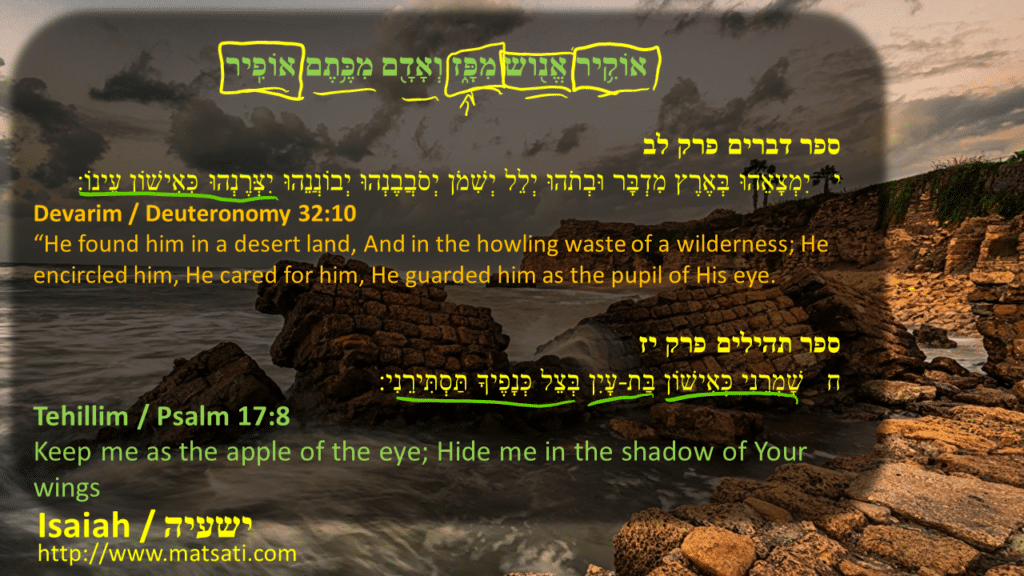
ספר דברים פרק לב
[י יִמְצָאֵהוּ בְּאֶרֶץ מִדְבָּר וּבְתֹהוּ יְלֵל יְשִׁמֹן יְסֹבֲבֶנְהוּ יְבוֹנֲנֵהוּ יִצְּרֶנְהוּ כְּאִישׁוֹן עֵינוֹ:
Devarim / Deuteronomy 32:10
“He found him in a desert land, And in the howling waste of a wilderness; He encircled him, He cared for him, He guarded him as the pupil of His eye.
ספר תהילים פרק יז
ח שָׁמְרֵנִי כְּאִישׁוֹן בַּת-עָיִן בְּצֵל כְּנָפֶיךָ תַּסְתִּירֵנִי:
Tehillim / Psalm 17:8
Keep me as the apple of the eye; Hide me in the shadow of Your wings
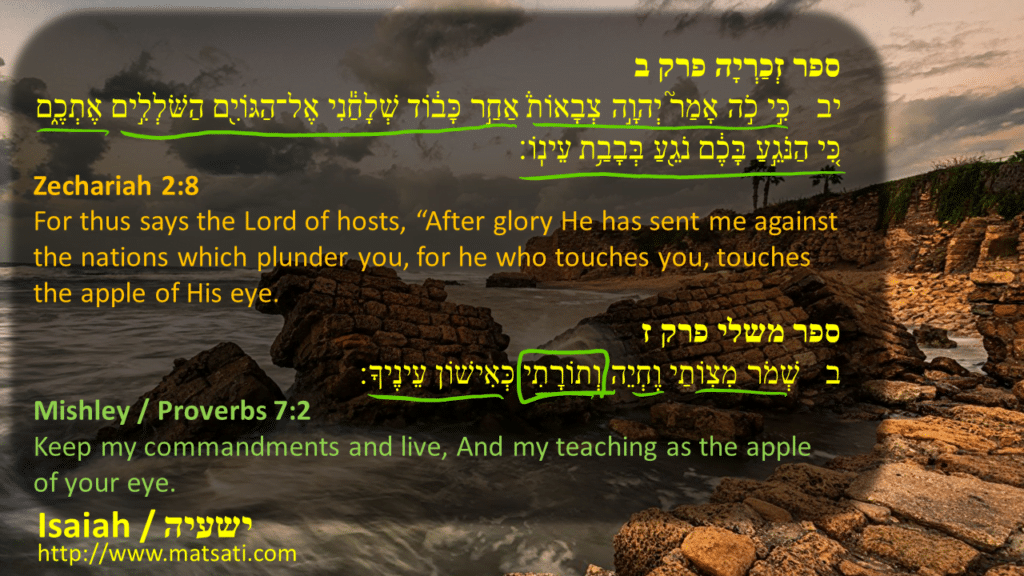
ספר זְכַרְיָה פרק ב
יב כִּ֣י כֹ֣ה אָמַר֮ יְהוָ֣ה צְבָאוֹת֒ אַחַ֣ר כָּב֔וֹד שְׁלָחַ֕נִי אֶל־הַגּוֹיִ֖ם הַשֹּׁלְלִ֣ים אֶתְכֶ֑ם כִּ֚י הַנֹּגֵ֣עַ בָּכֶ֔ם נֹגֵ֖עַ בְּבָבַ֥ת עֵינֽוֹ׃
Zechariah 2:8
For thus says the Lord of hosts, “After glory He has sent me against the nations which plunder you, for he who touches you, touches the apple of His eye.
ספר משלי פרק ז
ב שְׁמֹר מִצְוֹתַי וֶחְיֵה וְתוֹרָתִי כְּאִישׁוֹן עֵינֶיךָ:
Mishley / Proverbs 7:2
Keep my commandments and live, And my teaching as the apple of your eye.
Being the apple of God’s eye means that one is the very center of God’s focus and protection. He loves and protects His people even when they are stubborn and rebellious or are caught in the worst of situations. His care for His people remains constant. In a similar fashion, we are to keep the Lord God of Israel, His Messiah, and His instructions as the apple of our eye. If we do so, our houses and our land will not become the habitat of dark and lonely creatures as we read in Isaiah 13:21-22. The Lord God Himself will lift us up, he will establish us, and make our foot secure and steadfast to walk in His holy and righteous ways! The place that was once lonely becomes filled with love, and peace, and joy and happiness, in fulfillment of the promises of God according to His Word for those who would seek His presence in their lives!
Rabbinic Commentary on Isaiah 13:12-22
The Targum Jonathan is a rabbinic interpretation of the book of Isaiah and so it becomes an important text to examine in our studying of the book of Isaiah.
תרגום יונתן בן עוזיאל אל ישעיה פרק יג:יב-כב
יב אְחַבֵיב דָחְלַי מִדַהבָא דְמִתיַקְרִין מִנֵיה בְנֵי אְנָשָא וְעָבְדֵי אֹורָיתָא מִמַסנְנָא דְאֹופִיר׃ יג עַל כֵין שְמַיָא אְזִיַע וּתזוּעַ אַרעָא מֵאַתרַה בְתַעְבוּר מִן קֳדָם יוי צְבָאֹות וּביֹום תְקֹוף רוּגזֵיה׃ יד וִיהֵי כִצבִי מַפרִיד וּכעָן וְלֵית דִמכַנֵיש גְבַר לְעַמֵיה יִתפְנֹון וּגבַר לְאַרעֵיה יִערְקוּן׃ טו כָל דְיִשתְכַח בַה יִתקְטִיל וְכָל דְיֵיעֹול לְכַרכֵי צְיָרָא יִתקְטִיל בְחַרבָא׃ טז וְיָנְקֵיהֹון יִטָרְפוּן לְעֵינֵיהֹון יִתבַזְזוּן בָתֵיהֹון וּנשֵיהֹון יִשתַכבָן׃ יז הָאְנָא מֵיתֵי עְלֵיהֹון יָת מָדָאֵי דִבכַספָא לָא מִטַפסִין וְדַהבָא לָא מִתרְעַן בֵיה׃ יח וְקַשתָתְהֹון עוּלֵימִין יְבַזְעָן וְעַל וְלַד מְעִין לָא יְרַחְמוּן עַל בְנַיָא לָא תְחוּס עֵינְהֹון׃ יט וּתהֵי בָבַל דַהְוָת מִלְקַדמִין חַדוַת מַלכְווָן תֻשבְחַת רְבוּת כַסדָאֵי כַהְפֵיכְתָא דַהְפַך יוי יָת סְדֹם וְיָת עְמֹורָה׃ כ לָא תִתֵיב לְעָלַם וְלָא תִשרֵי עַד דָר וְדָר וְלָא יִפרֹוס תַמָן עַרבַי מַשכְנֵיה וְרָעְייָן לָא יִשרֹון תַמָן׃ כא וְיִשרְיָן תַמָן תָמוָן וְיִתמְלֹון בָתֵיהֹון אֹוחִין וְיִשרְייָן תַמָן בְנָת נַעָמיָן וְשֵידִין יְחָייְכוּן תַמָן׃ כב וִינַצְפוּן חָתֹולִין בְבִירָניָתְהֹון וְיָרוּרִין בְבֵית מִשרֵי תַפנוּקֵיהֹון וְקָרִיב לְמֵיתֵי עִידָן תְבָרַה דְבָבַל וְיֹומַהָא לָא יִתרַחְקוּן׃
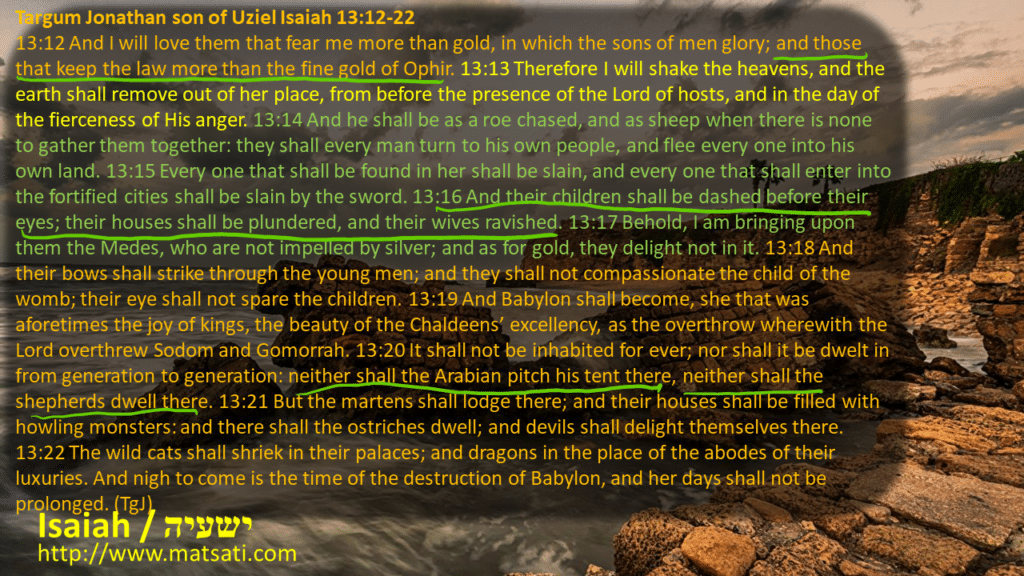
Targum Jonathan son of Uziel Isaiah 13:12-22
13:12 And I will love them that fear me more than gold, in which the sons of men glory; and those that keep the law more than the fine gold of Ophir. 13:13 Therefore I will shake the heavens, and the earth shall remove out of her place, from before the presence of the Lord of hosts, and in the day of the fierceness of His anger. 13:14 And he shall be as a roe chased, and as sheep when there is none to gather them together: they shall every man turn to his own people, and flee every one into his own land. 13:15 Every one that shall be found in her shall be slain, and every one that shall enter into the fortified cities shall be slain by the sword. 13:16 And their children shall be dashed before their eyes; their houses shall be plundered, and their wives ravished. 13:17 Behold, I am bringing upon them the Medes, who are not impelled by silver; and as for gold, they delight not in it. 13:18 And their bows shall strike through the young men; and they shall not compassionate the child of the womb; their eye shall not spare the children. 13:19 And Babylon shall become, she that was aforetimes the joy of kings, the beauty of the Chaldeens’ excellency, as the overthrow wherewith the Lord overthrew Sodom and Gomorrah. 13:20 It shall not be inhabited for ever; nor shall it be dwelt in from generation to generation: neither shall the Arabian pitch his tent there, neither shall the shepherds dwell there. 13:21 But the martens shall lodge there; and their houses shall be filled with howling monsters: and there shall the ostriches dwell; and devils shall delight themselves there. 13:22 The wild cats shall shriek in their palaces; and dragons in the place of the abodes of their luxuries. And nigh to come is the time of the destruction of Babylon, and her days shall not be prolonged. (TgJ)
According to Isaiah 13:12 interpreted by Johnathan ben Uziel, the Targum states, יב אְחַבֵיב דָחְלַי מִדַהבָא דְמִתיַקְרִין מִנֵיה בְנֵי אְנָשָא וְעָבְדֵי אֹורָיתָא מִמַסנְנָא דְאֹופִיר׃ 13:12 And I will love them that fear me more than gold, in which the sons of men glory; and those that keep the law more than the fine gold of Ophir. (TgJ) Wow, isn’t this an amazing way to interpret the preciousness of God’s people! TgJ writes about the love of God of those who fear Him. The TgJ is consistent with the Torah perspective, of the Lord God loving them that fear Him more than all the wealth in the world, and those who keep the Torah as opposed to acquiring wealth. The Jewish commentary on this verse states the following:
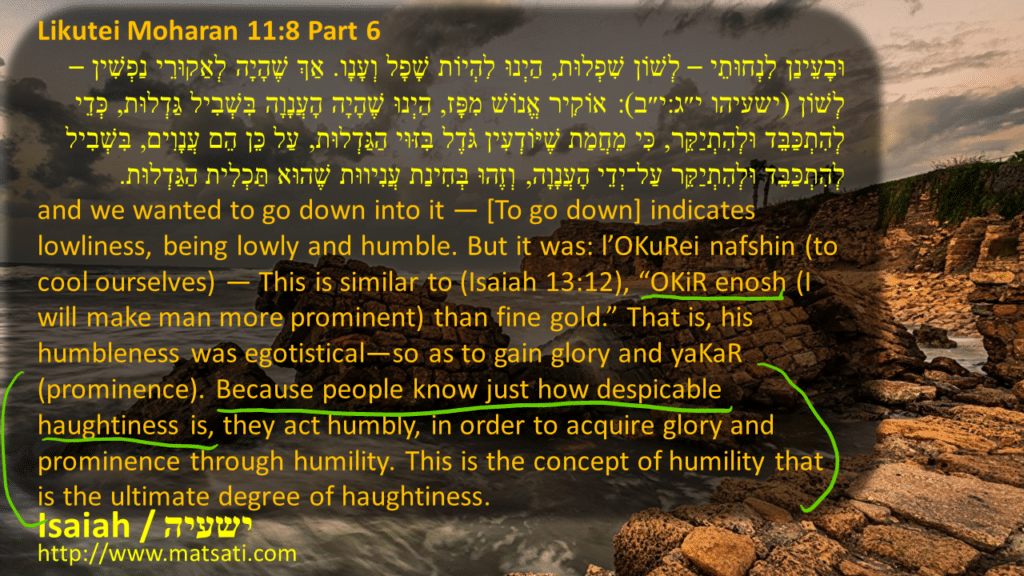
Likutei Moharan 11:8 Part 6
וּבָעֵינַן לִנְחוּתֵי – לְשׁוֹן שִׁפְלוּת, הַיְנוּ לִהְיוֹת שָׁפָל וְעָנָו. אַךְ שֶׁהָיָה לְאַקוּרֵי נַפְשִׁין – לְשׁוֹן (ישעיהו י״ג:י״ב): אוֹקִיר אֱנוֹשׁ מִפָּז, הַיְנוּ שֶׁהָיָה הָעֲנָוָה בִּשְׁבִיל גַּדְלוּת, כְּדֵי לְהִתְכַּבֵּד וּלְהִתְיַקֵּר, כִּי מֵחֲמַת שֶׁיּוֹדְעִין גֹּדֶל בִּזּוּי הַגַּדְלוּת, עַל כֵּן הֵם עֲנָוִים, בִּשְׁבִיל לְהִתְכַּבֵּד וּלְהִתְיַקֵּר עַל־יְדֵי הָעֲנָוָה, וְזֶהוּ בְּחִינַת עֲנִיווּת שֶׁהוּא תַּכְלִית הַגַּדְלוּת.
and we wanted to go down into it — [To go down] indicates lowliness, being lowly and humble. But it was: l’OKuRei nafshin (to cool ourselves) — This is similar to (Isaiah 13:12), “OKiR enosh (I will make man more prominent) than fine gold.” That is, his humbleness was egotistical—so as to gain glory and yaKaR (prominence). Because people know just how despicable haughtiness is, they act humbly, in order to acquire glory and prominence through humility. This is the concept of humility that is the ultimate degree of haughtiness.
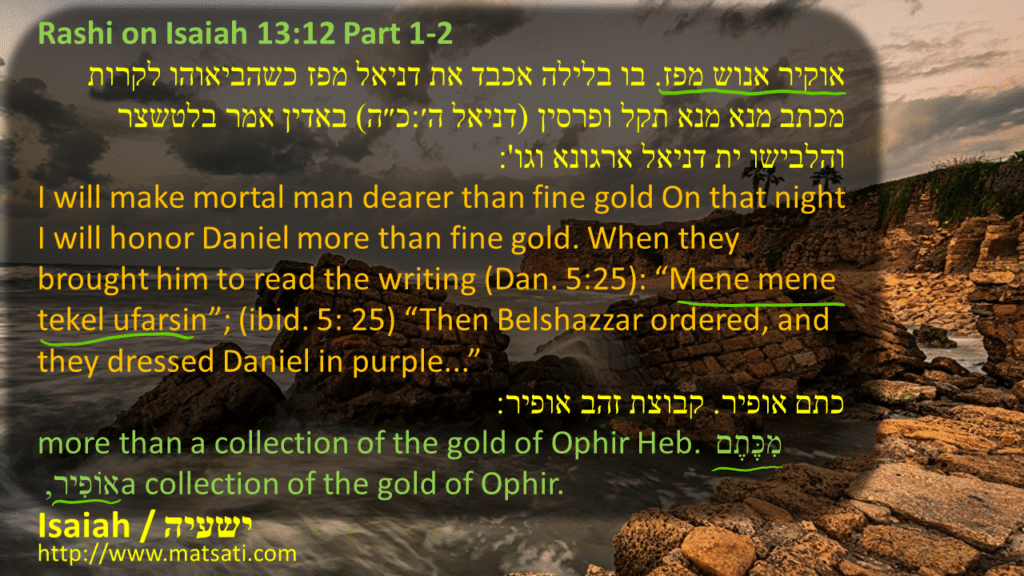
Rashi on Isaiah 13:12 Part 1-2
אוקיר אנוש מפז. בו בלילה אכבד את דניאל מפז כשהביאוהו לקרות מכתב מנא מנא תקל ופרסין (דניאל ה׳:כ״ה) באדין אמר בלטשצר והלבישו ית דניאל ארגונא וגו’:
I will make mortal man dearer than fine gold On that night I will honor Daniel more than fine gold. When they brought him to read the writing (Dan. 5:25): “Mene mene tekel ufarsin”; (ibid. 5: 25) “Then Belshazzar ordered, and they dressed Daniel in purple…”
כתם אופיר. קבוצת זהב אופיר:
more than a collection of the gold of Ophir Heb. מִכֶּתֶם אוֹפִיר, a collection of the gold of Ophir.
Notice how the discussion centers around being humble (Likutei Moharan 11:8 Part 6) and draws out the idea that the Lord God is the one who we should seek to make us well respected among men as opposed to walking in personal pride. The commentary goes on to describe how despicable haughtiness is. To be haughty means to be blatantly and disdainfully proud. The word is used in the KJV to describe arrogance, and when one sets oneself up above others being disdainful towards others in their pride. We note that according to King Solomon in Mishley / Proverbs 6:16-19, Solomon lists the six things that God hates, and that seven things are an abomination to Him. The very first one that is listed is “haughty eyes,” then followed by a lying tongue, hands that shed innocent blood, a false witness, and feet that are quick to run to evil. Solomon also writes in Mishley / Proverbs 21:4 that haughty eyes and a proud heart are sinful before God. This description of being haughty is the setting up of one’s attitude that causes one to look down on others. The setting of oneself above others is synonymous to walking contrary to God’s ways in holiness, righteousness, and truth. The proud, the haughty, they make themselves the center of the world that everything revolves around them. The end result of this is little concern for the will of God in one’s life. The dangers of pride are found in the tendency of man to exalt himself above others which leads to disrespect, superiority, and oppression of the poor. The NT text encourages humility (see James 4:6, 1 Peter 5:6) and states that it is God who gives us His mercy and His grace for the purpose of humbling our lives. Isaiah 66:2 states that the humble heart draws the attention of God in heaven. The proud heart resists God, he becomes retractable, uncaring, and hardened to mercy, whereas the humble heart provides the proper perspective. Rashi describes the humble heart that was in Daniel when he was brought to read the words “Mene mene tekel ufarsin” (Daniel 5: 25). After Daniel’s interpretation, we read that Belshazzar ordered, and they dressed Daniel in purple, meaning that he was honored greatly as a holy man of God. The idea here is that the Lord God Almighty gave Daniel the inspiration to understand these mysteries and to interpret dreams, and so God was honoring him who was willing to humble himself before men. This same thing can happen today if we are willing to serve the Lord, He will honor us as we honor Him!
Isaiah goes on according to the TgJ translation saying, יג עַל כֵין שְמַיָא אְזִיַע וּתזוּעַ אַרעָא מֵאַתרַה בְתַעְבוּר מִן קֳדָם יוי צְבָאֹות וּביֹום תְקֹוף רוּגזֵיה׃ 13:13 Therefore I will shake the heavens, and the earth shall remove out of her place, from before the presence of the Lord of hosts, and in the day of the fierceness of His anger. (TgJ) We note how sin, and especially pride, has cosmic consequences as illustrated in God shaking heaven and earth, breaking the foundation stones to those things who place their trust in this physical world. Rashi interprets this verse in the following way:
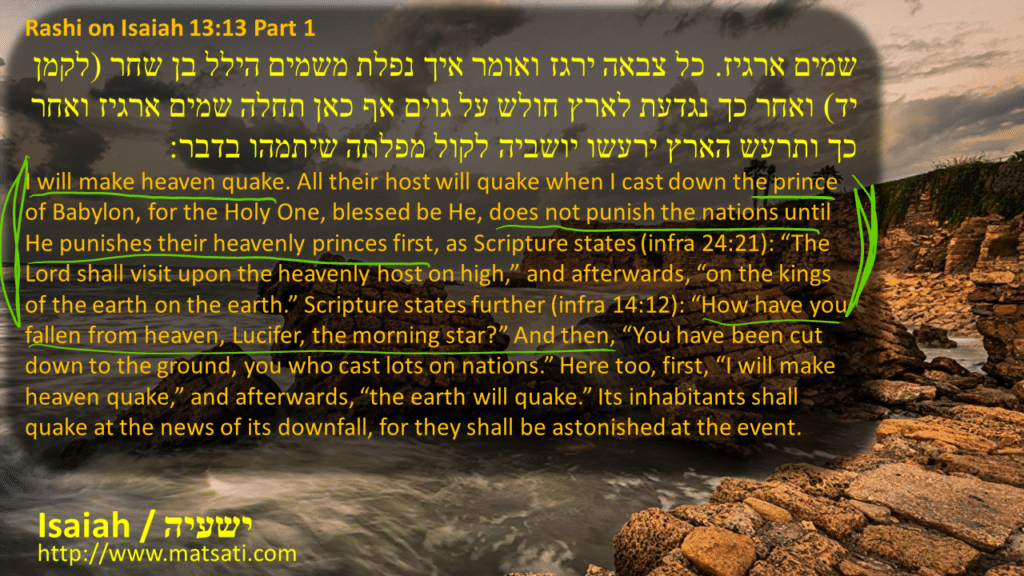
Rashi on Isaiah 13:13 Part 1
שמים ארגיז. כל צבאה ירגז ואומר איך נפלת משמים הילל בן שחר (לקמן יד) ואחר כך נגדעת לארץ חולש על גוים אף כאן תחלה שמים ארגיז ואחר כך ותרעש הארץ ירעשו יושביה לקול מפלתה שיתמהו בדבר:
I will make heaven quake. All their host will quake when I cast down the prince of Babylon, for the Holy One, blessed be He, does not punish the nations until He punishes their heavenly princes first, as Scripture states (infra 24:21): “The Lord shall visit upon the heavenly host on high,” and afterwards, “on the kings of the earth on the earth.” Scripture states further (infra 14:12): “How have you fallen from heaven, Lucifer, the morning star?” And then, “You have been cut down to the ground, you who cast lots on nations.” Here too, first, “I will make heaven quake,” and afterwards, “the earth will quake.” Its inhabitants shall quake at the news of its downfall, for they shall be astonished at the event.
Rashi states that when God casts down Babylon the great, the great army (צבאה) will quake. Note how the nations worship the stars and constellations. Rashi connects this to God first punishing their gods in the heavenly places prior to punishing the nation who serves them. Note how consistent this is with what we read according to Matthew 24:29 Immediately after the tribulation of those days: ‘The sun will be darkened, and the moon will not give its light; the stars will fall from the sky, and the powers of the heavens will be shaken.’ 24:30 At that time the sign of the Son of Man will appear in heaven, and all the tribes of the earth will mourn. They will see the Son of Man coming on the clouds of heaven, with power and great glory. (BRB) Rashi connects Isaiah 14:12 and Lucifer to this proud one being cast down. Lucifer is known as the name of Satan, the Evil One, the arch enemy of God. It is interesting that the word Lucifer is not found in the Hebrew bible, it is not found in the Septuagint (Greek translation of Tanakh) either. Lucifer is a Latin translation of the Hebrew text. This connection to the stars of heaven is analogized to the angels of God. This star or angelic being, due to his pride, was cast down to earth. Lucifer was a mighty angelic being who was cast down to earth due to his pride. Note that it doesn’t matter how great or powerful an angel is, the Lord God Almighty is ultimately the most powerful of all as he is the Creator! Note the parallel to the Babylonian king. This powerful one when he is brought low by the power of God, Rashi states that this is the interpretation of the heavens quaking and afterwards the earth quaking, as the inhabitants placed their trust in him, and the news of his downfall will astonish the hearts of men. There are many parallels to these things throughout the Scriptures. The significant point is related to the Almighty God who has authority and power over all in both in the spiritual and physical realms.
Isaiah goes on to describe the nature of war according to the TgJ saying, ד וִיהֵי כִצבִי מַפרִיד וּכעָן וְלֵית דִמכַנֵיש גְבַר לְעַמֵיה יִתפְנֹון וּגבַר לְאַרעֵיה יִערְקוּן׃ 13:14 And he shall be as a roe chased, and as sheep when there is none to gather them together: they shall every man turn to his own people, and flee every one into his own land. טו כָל דְיִשתְכַח בַה יִתקְטִיל וְכָל דְיֵיעֹול לְכַרכֵי צְיָרָא יִתקְטִיל בְחַרבָא׃ וְיָנְקֵיהֹון יִטָרְפוּן לְעֵינֵיהֹון יִתבַזְזוּן בָתֵיהֹון וּנשֵיהֹון יִשתַכבָן׃ 13:15 Every one that shall be found in her shall be slain, and every one that shall enter into the fortified cities shall be slain by the sword. טז וְיָנְקֵיהֹון יִטָרְפוּן לְעֵינֵיהֹון יִתבַזְזוּן בָתֵיהֹון וּנשֵיהֹון יִשתַכבָן׃ 13:16 And their children shall be dashed before their eyes; their houses shall be plundered, and their wives ravished. יז הָאְנָא מֵיתֵי עְלֵיהֹון יָת מָדָאֵי דִבכַספָא לָא מִטַפסִין וְדַהבָא לָא מִתרְעַן בֵיה׃ 13:17 Behold, I am bringing upon them the Medes, who are not impelled by silver; and as for gold, they delight not in it. (TgJ) The Midrash Esther Rabbah 5:3 has the following to say concerning these verses from Isaiah 13:14-17.
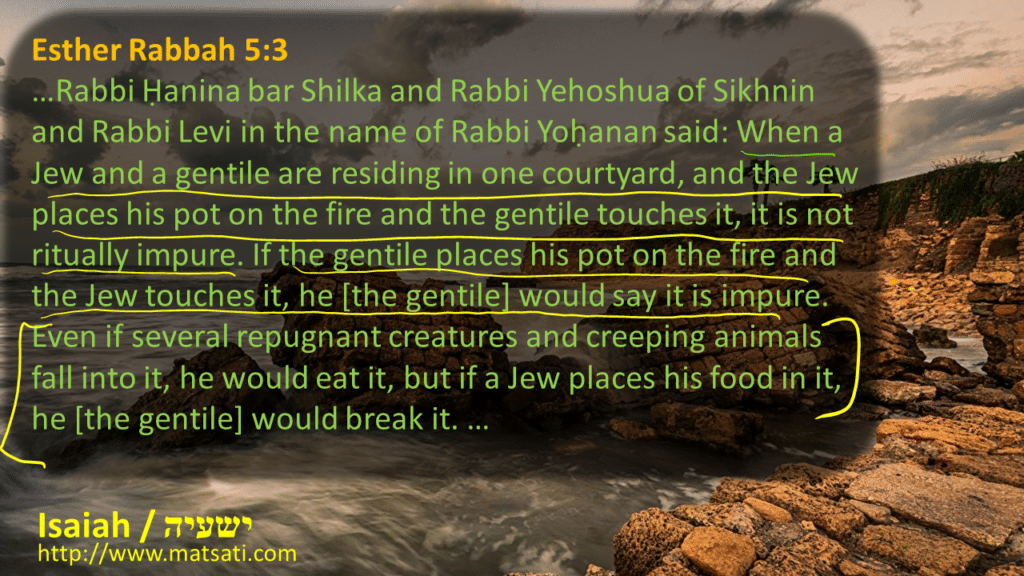
Esther Rabbah 5:3
“Have the king appoint officials in all the provinces of his kingdom and they will gather every virgin young woman of fair appearance to the Shushan citadel, to the harem, to the custody of Hegai the king’s eunuch, guardian of the women, and their cosmetics will be provided.” (Esther 2:3). “Have the king appoint officials in all the provinces of his kingdom” – What did he [the king] see? Rabbi Huna said: Because they would demean the daughters of Israel and call them ugly, and that no person would look at them; therefore, they [the women of the kingdom] came into the hands of this purveyor. Rabbi Ḥanina bar Shilka and Rabbi Yehoshua of Sikhnin and Rabbi Levi in the name of Rabbi Yoḥanan said: When a Jew and a gentile are residing in one courtyard, and the Jew places his pot on the fire and the gentile touches it, it is not ritually impure. If the gentile places his pot on the fire and the Jew touches it, he [the gentile] would say it is impure. Even if several repugnant creatures and creeping animals fall into it, he would eat it, but if a Jew places his food in it, he [the gentile] would break it. So, it is written: “Muster archers against Babylon, all who draw the bow, […repay it in accordance with its actions]” (Jeremiah 50:29). Did it take silver that it will repay silver, gold that it will repay gold? “They ravished women in Zion” (Lamentations 5:11). What does it teach? Rather, so said the Holy One blessed be He: You are eager for licentiousness; by your lives, I will bring upon you a nation that seeks neither silver nor gold from you. That is what is written: “Behold, I will rouse Media against them, who do not appreciate silver and do not desire gold” (Isaiah 13:17). What do they seek from you? “And bows will cleave youths, and they will not have mercy on the fruit of the womb” (Isaiah 13:18). “To the custody of Hegai, the king’s eunuch [seris], guardian of the women” (Esther 2:3) – he was crushed,14His testicles were crushed. and was appointed over the virgins. Similarly, “to the custody of Shaashgaz, official [seris] of the king, guardian of the concubines” (Esther 2:14) – he was withered and was appointed over the wives.
The reason these evils are being brought upon the nation of Israel, Judah, and Jerusalem, are due to their unrepentant sins and their unwillingness to listen to the Lord God in heaven. Their relentless walking in the ways of the nations and serving false gods has led to their destruction. The Midrash makes an interesting comparison of gentiles and Jews in regards to food. The idea is that of pride and the despising of other people, particularly antisemitism and what is interesting is how the rabbis speak of the parable in a way suggesting that the gentiles will consider one touching the pot as making the contents unclean, as opposed to all manager of unclean creeping things falling in and yet in their own mind the contents remain clean and perfectly good for food. This has a parallel to the events that are taking place here during Isaiah’s time. These things remind us of the significance of walking in God’s ways, of believing in the Word of God (The Scriptures) and applying His Words to our lives. King Solomon wrote about this according to Mishley / Proverbs 9:1-12.
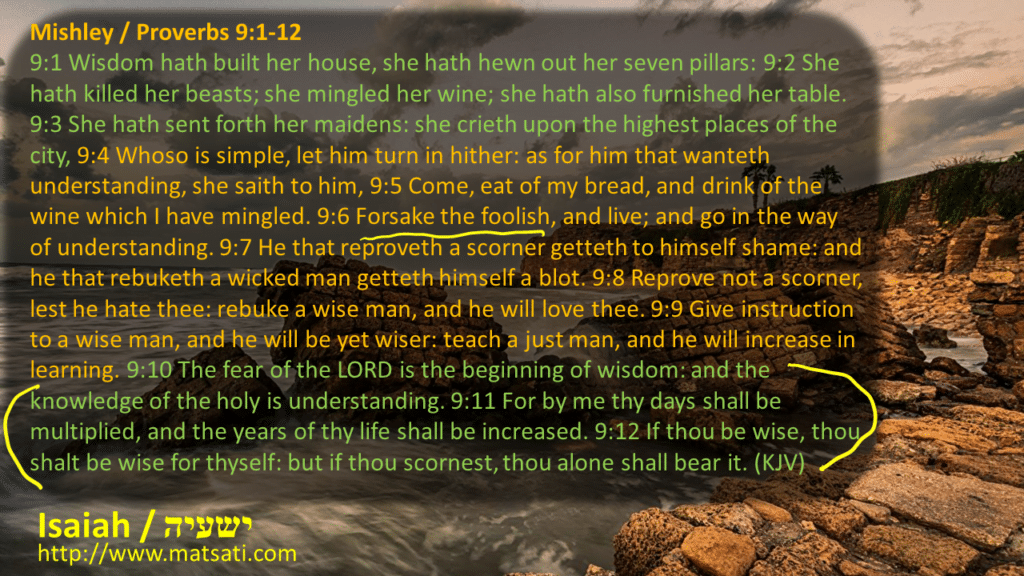
ספר משלי פרק ט
א חָכְמוֹת בָּנְתָה בֵיתָהּ חָצְבָה עַמּוּדֶיהָ שִׁבְעָה: ב טָבְחָה טִבְחָהּ מָסְכָה יֵינָהּ אַף עָרְכָה שֻׁלְחָנָהּ: ג שָׁלְחָה נַעֲרֹתֶיהָ תִקְרָא עַל-גַּפֵּי מְרֹמֵי קָרֶת: ד מִי-פֶתִי יָסֻר הֵנָּה חֲסַר-לֵב אָמְרָה לּוֹ: ה לְכוּ לַחֲמוּ בְלַחֲמִי וּשְׁתוּ בְּיַיִן מָסָכְתִּי: ו עִזְבוּ פְתָאיִם וִחְיוּ וְאִשְׁרוּ בְּדֶרֶךְ בִּינָה: ז יֹסֵר | לֵץ לֹקֵחַ לוֹ קָלוֹן וּמוֹכִיחַ לְרָשָׁע מוּמוֹ: ח אַל-תּוֹכַח לֵץ פֶּן-יִשְֹנָאֶךָּ הוֹכַח לְחָכָם וְיֶאֱהָבֶךָּ: ט תֵּן לְחָכָם וְיֶחְכַּם-עוֹד הוֹדַע לְצַדִּיק וְיוֹסֶף לֶקַח: י תְּחִלַּת חָכְמָה יִרְאַת יְהֹוָה וְדַעַת קְדֹשִׁים בִּינָה: יא כִּי-בִי יִרְבּוּ יָמֶיךָ וְיוֹסִיפוּ לְּךָ שְׁנוֹת חַיִּים: יב אִם-חָכַמְתָּ חָכַמְתָּ לָּךְ וְלַצְתָּ לְבַדְּךָ תִשָּׂא:
Mishley / Proverbs 9:1-12
9:1 Wisdom hath built her house, she hath hewn out her seven pillars: 9:2 She hath killed her beasts; she mingled her wine; she hath also furnished her table. 9:3 She hath sent forth her maidens: she crieth upon the highest places of the city, 9:4 Whoso is simple, let him turn in hither: as for him that wanteth understanding, she saith to him, 9:5 Come, eat of my bread, and drink of the wine which I have mingled. 9:6 Forsake the foolish, and live; and go in the way of understanding. 9:7 He that reproveth a scorner getteth to himself shame: and he that rebuketh a wicked man getteth himself a blot. 9:8 Reprove not a scorner, lest he hate thee: rebuke a wise man, and he will love thee. 9:9 Give instruction to a wise man, and he will be yet wiser: teach a just man, and he will increase in learning. 9:10 The fear of the LORD is the beginning of wisdom: and the knowledge of the holy is understanding. 9:11 For by me thy days shall be multiplied, and the years of thy life shall be increased. 9:12 If thou be wise, thou shalt be wise for thyself: but if thou scornest, thou alone shall bear it. (KJV)
We note something here about wisdom, the descriptions are of wisdom building a place for people to come and live, to eat and to drink. The idea here is taking what wisdom has prepared and making it a part of our lives through this concept of eating and drinking. Remember that the kind of food we eat determines whether we will be healthy or sick. When we eat, the nutrient content of the food is broken down to provide nourishment for our bodies. If we choose to eat unhealthy highly processed foods with lots of sugar, our bodies will not handle this very well and it will not just prematurely age us but also lead to various diseases and ultimately an early death (i.e. heart disease, cancer, etc). These things are scientifically proven. What we read in the Scriptures is related to the kind of spiritual diet that we have. Yeshua used a similar analogy in John 6:53-57 regarding eating his flesh and drinking his blood. We know this had nothing to do with literally eating and drinking his body and blood, respectively. We are told later on that what he referred to was spiritual. The point he was making was to speak in parables, similar to how we read Mishley / Proverbs 9:1-12 on the wisdom of God. (Side note: remember the seven spirits of God which are sent out into all the world. One of them is wisdom. See Isaiah 11:2 and Revelation.) Yeshua was speaking of making his teachings a part of our lives! This is analogous to being wise to apply God’s word to our lives, to walk in God’s holy and righteous ways. This would lead to life, security, and peace from the surrounding nations. The Jewish concept of living our lives in God’s ways is known as having musar. The Midrash is describing how the musar of the nations is not the same as the musar of God. Musar (מוּסָר) is defined as having discipline, chastening, correction in our lives. Musar is a Jewish spiritual practice that gives concrete instructions on how to live a meaningful and ethical life, a life that God is pleased with. Musar is virtue-based and ethics-based on the idea that by cultivating inner virtues, we improve ourselves. This is in contrast to most Jewish ethical teachings, which are rule-based. Today, a number of people who do not follow traditional Jewish rules and rituals are attracted to Mussar because it offers opportunities for personal transformation through a Jewish lens. The idea here in relation to sin and the gentile nations, what the nations consider of great value in behavior is as “repugnant creatures and creeping animals fall into the pot,” and these things being ignored based upon pride and arrogance. This is paralleled to one usurping authority over another human being and oppressing them whether in one’s own heart or in practice. The word musar denotes fatherly correction which is intended to impart moral discipline and character development of a child. This is the primary reason the Lord God in heaven reveals Himself to us by His attributes of love, mercy, morals, and ethics according to His Torah. Having knowledge of these things leads to godly sorrow when we violate them and then performing Teshuvah (Repentance). Note what we read according to Devarim / Deuteronomy 8:1-2.
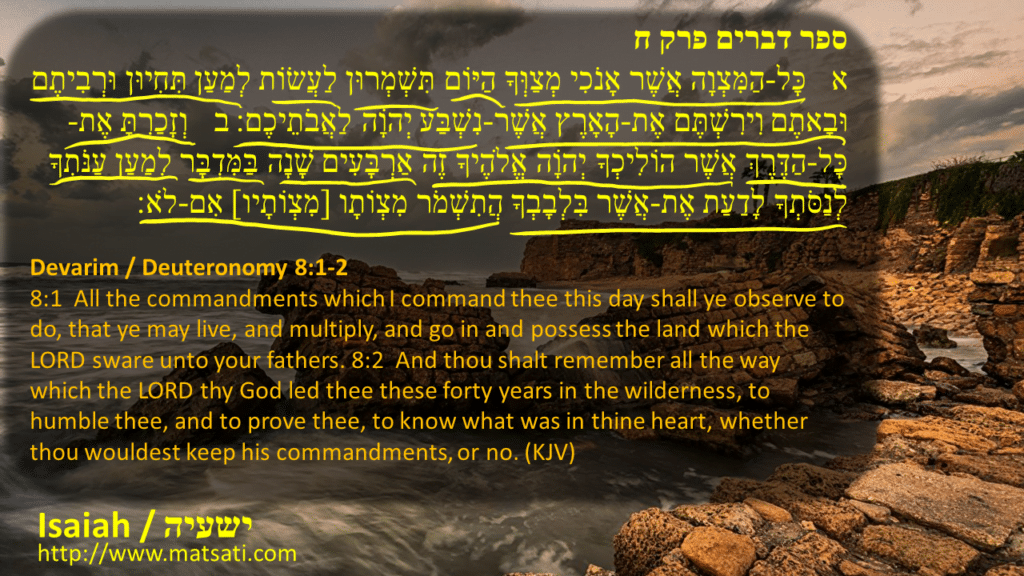
ספר דברים פרק ח
א כָּל-הַמִּצְוָה אֲשֶׁר אָנֹכִי מְצַוְּךָ הַיּוֹם תִּשְׁמְרוּן לַעֲשֹוֹת לְמַעַן תִּחְיוּן וּרְבִיתֶם וּבָאתֶם וִירִשְׁתֶּם אֶת-הָאָרֶץ אֲשֶׁר-נִשְׁבַּע יְהוָֹה לַאֲבֹתֵיכֶם: ב וְזָכַרְתָּ אֶת-כָּל-הַדֶּרֶךְ אֲשֶׁר הוֹלִיכְךָ יְהוָֹה אֱלֹהֶיךָ זֶה אַרְבָּעִים שָׁנָה בַּמִּדְבָּר לְמַעַן עַנֹּתְךָ לְנַסֹּתְךָ לָדַעַת אֶת-אֲשֶׁר בִּלְבָבְךָ הֲתִשְׁמֹר מִצְוֹתָו [מִצְוֹתָיו] אִם-לֹא:
Devarim / Deuteronomy 8:1-2
8:1 All the commandments which I command thee this day shall ye observe to do, that ye may live, and multiply, and go in and possess the land which the LORD sware unto your fathers. 8:2 And thou shalt remember all the way which the LORD thy God led thee these forty years in the wilderness, to humble thee, and to prove thee, to know what was in thine heart, whether thou wouldest keep his commandments, or no. (KJV)
Here we are told the Lord God tests our hearts to know the inner condition, whether we are repentant or callus to righteousness and holiness? Whether we are willing to humble our hearts and listen to the voice of God, to learn to rely upon God’s provision for our lives or trust in our own wealth, knowledge, and strength. By humbling our lives and submitting to God’s Holy word, we can genuinely understand that כִּי לֹא עַל-הַלֶּחֶם לְבַדּוֹ יִחְיֶה הָאָדָם כִּי עַל-כָּל-מוֹצָא פִי-יְהוָֹה יִחְיֶה הָאָדָם “man does not live on bread alone, but on everything that proceeds or comes forth from the mouth of God.” This is what was missing from the lives of the people in Israel, Judah, and Jerusalem. Their long period of unrepentant sin led to their being partakers of wrath. If they would have humbled themselves and listened to the voice of God according to the Scriptures, they would have been partakers of holiness, grounded in His love, and reaped the reward of being good stewards of what God has given them. Nevertheless, their sins brought destruction, as the Targum continues saying the following in Isaiah 13:18-22.
The Babylonians warriors are described as being merciless, according to the TgJ saying, יח וְקַשתָתְהֹון עוּלֵימִין יְבַזְעָן וְעַל וְלַד מְעִין לָא יְרַחְמוּן עַל בְנַיָא לָא תְחוּס עֵינְהֹון׃ 13:18 And their bows shall strike through the young men; and they shall not compassionate the child of the womb; their eye shall not spare the children. יט וּתהֵי בָבַל דַהְוָת מִלְקַדמִין חַדוַת מַלכְווָן תֻשבְחַת רְבוּת כַסדָאֵי כַהְפֵיכְתָא דַהְפַך יוי יָת סְדֹם וְיָת עְמֹורָה׃ 13:19 And Babylon shall become, she that was aforetimes the joy of kings, the beauty of the Chaldeens’ excellency, as the overthrow wherewith the Lord overthrew Sodom and Gomorrah. כ לָא תִתֵיב לְעָלַם וְלָא תִשרֵי עַד דָר וְדָר וְלָא יִפרֹוס תַמָן עַרבַי מַשכְנֵיה וְרָעְייָן לָא יִשרֹון תַמָן׃ 13:20 It shall not be inhabited for ever; nor shall it be dwelt in from generation to generation: neither shall the Arabian pitch his tent there, neither shall the shepherds dwell there. כא וְיִשרְיָן תַמָן תָמוָן וְיִתמְלֹון בָתֵיהֹון אֹוחִין וְיִשרְייָן תַמָן בְנָת נַעָמיָן וְשֵידִין יְחָייְכוּן תַמָן׃ 13:21 But the martens shall lodge there; and their houses shall be filled with howling monsters: and there shall the ostriches dwell; and devils shall delight themselves there. כב וִינַצְפוּן חָתֹולִין בְבִירָניָתְהֹון וְיָרוּרִין בְבֵית מִשרֵי תַפנוּקֵיהֹון וְקָרִיב לְמֵיתֵי עִידָן תְבָרַה דְבָבַל וְיֹומַהָא לָא יִתרַחְקוּן׃ 13:22 The wild cats shall shriek in their palaces; and dragons in the place of the abodes of their luxuries. And nigh to come is the time of the destruction of Babylon, and her days shall not be prolonged. (TgJ) Isaiah prophetically speaks of the destruction of Babylon as similar to that of Sodom and Gomorrah. Clearly, the Word of God teaches that sin brings spiritual death or separation from God. The Scriptures also say that sin brings physical death as well if it is ignored and left alone long enough. The Scriptures tell us that because of these things God restrains Himself and does not discipline us immediately when we sin but gives us an opportunity to repent and confess our sins. This is significant in demonstrating the love of God. It is important to remember that repentance includes turning away from one’s sin. Paul wrote in Romans 2:4-6 that God delays punishment in order to give us an opportunity to repent. (See also 2 Peter 3:9) Something we need to keep in mind though is that God created this world and all that is in it. The example of the flood of Noah’s day is evidence that He is willing to bring judgment on the earth for sin. God is not late or slow, He is patient and merciful. These things from the book of Isaiah remind us that the day of the Lord will come eventually. We are being given time to repent, turn from our sins, and seek a holy and righteous God. When the day of the Lord comes, everything will be destroyed and we are told a new heaven and earth will be established, one without sin. Now is the time to repent, to believe, and to seek the God in heaven and His Messiah Yeshua. If we do not seek these things now, then that great day of the Lord will come at a time when we least expect it! These things are written for a warning and for hope!
